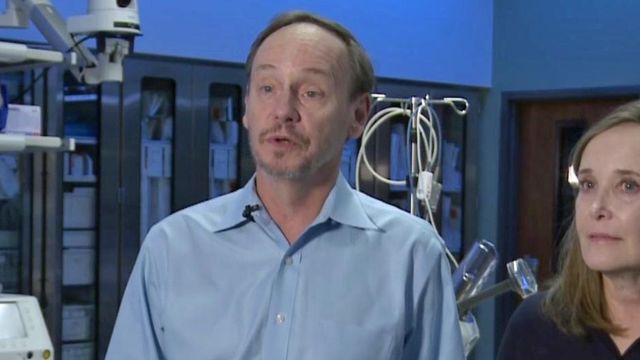Technology allows doctors to 'hit the pause button' in treatment of cardiac arrest patients
When a heart suddenly stops beating, life hangs in the balance but if a patient gets to a hospital, doctors still need time to diagnose the cause so they can fix it.
Posted — UpdatedIn March 2017, urologist Dr. Norman Goldbach drove to see patients at UNC Rex Health Care, even though he felt a bit light-headed. He couldn’t have known that he was about to suffer cardiac arrest while stopped at a busy intersection near the Crabtree Valley Mall.
“Somehow the car got put into park and I passed out and some bystander noticed and called 911,” Goldbach said.
A Wake County EMS crew quickly responded, but Goldbach’s life still hung in the balance as they brought him to North Carolina Heart and Vascular at Rex Hospital.
One-half of all patients hospitalized with cardiogenic shock don’t survive.
“Seconds matter. Minutes matter. Hours matter. As soon as you’re not delivering blood to the vital organs, they’re starving,” said UNC cardiologist Dr. Jason Katz.
Fortunately for Goldbach, a blocked vessel was opened, but he was still in a state of shock and placed on an ECMO machine.
“This allows us to hit the pause button and allow us to treat the underlying cause of their cardiac arrest, their shock,” said ECMO Medical Director Dr. Adam Peterik.
The ECMO is a miniature heart and lung machine that oxygenates the blood and breathes for a patient, according to Rex cardiac surgeon Dr. Alan Kypson.
Kypson said the ECMO system can keep the patient alive for several days or weeks.
“We can now move the machine not only in the hospital, but from hospital to hospital,” Kypson said.
Goldbach was eventually transferred to UNC Hospitals in Chapel Hill for extended heart therapy. He and his wife, Betty Ann, are thankful for the large team of specialists and the technology that allowed him to return home and to his urology practice.
“Living in this area, we are really blessed to have a program like this and it saved Norman’s life,” Golbach’s wife said.
The portable ECMO device has been associated with a 40 to 80 percent survival rate for patients who receive the therapy.
Related Topics
• Credits
Copyright 2024 by Capitol Broadcasting Company. All rights reserved. This material may not be published, broadcast, rewritten or redistributed.





